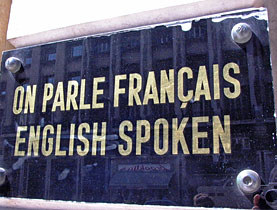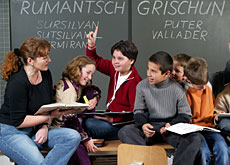English seen as “most useful” foreign language

A majority of Swiss reckon that English is the most useful foreign language in the country, although it is not Switzerland's "lingua franca" as commonly believed.
A National Science Foundation study also shows the Swiss have good multilingual skills, although the people of Luxembourg and the Dutch show more talent for speaking languages other than their own.
In Luxembourg, people speak three foreign languages, while in the Netherlands this figure is 2.2 and in Switzerland two. The European Union average before its expansion into eastern Europe was 1.14.
In German and Italian-speaking Switzerland, people speak approximately another 2.2 languages, mainly French and English. French speakers are less likely to make use of foreign languages (1.7).
The most frequently cited foreign languages in the study are French and German. English fails to come out in top position in any of the country’s linguistic regions.
In German-speaking Switzerland, French is the preferred option (71 per cent) ahead of English (67 per cent). In the French part of the country, High German and German dialect are also preferred to English (47 versus 43 per cent) while Italian speakers put German and French well in front.
For the researchers, led by Iwar Werlen of Bern University, this shows that contrary to what many Swiss think, English is not the country’s lingua franca.
“English is important for some sectors of the economy, but this concerns only a small part of the population,” Werlen told swissinfo. “There are others for whom English is irrelevant to their work, such as builders.”
However, if you ask people which foreign language they consider to be the most useful, more than eight out of ten say English. In the German-speaking part of the country, this figure is even higher than nine out of ten.
“People use English mainly for holidays abroad,” added Werlen. “It is also useful for internet because most information is in English.”
No solidarity
There is also little solidarity between French and Italian speakers. People from the German part of the country are more likely to consider French useful (46 per cent) than the inhabitants of Italian-speaking southern Switzerland (30 per cent).
French speakers aren’t in love with Italian either; only nine per cent consider it of any use.
Italian could even be considered to be threatened according to the study’s authors. English comes across as the most prestigious language for the Swiss, ahead of French, German – and Spanish.
The number of Italian speakers is also falling – a worrying trend according to Werlen, especially when it is considered of little use even in its own heartland.
“The decline of Italian migration to Switzerland means it is spoken less,” said Werlen. “The education system in much of Switzerland doesn’t do enough to promote Italian as a national language either.”
Official Swiss education policies promoting compulsory teaching of a second national language and introduced in 1975 seem to have produced positive results though. Most people polled for the study said learning a second language at school had left its mark on them.
swissinfo with agencies
The study was part of the ongoing National Research Programme 56, Language diversity and skills in Switzerland.
The researchers used a method already employed by the European Union, polling 400 people in German-speaking Switzerland, and 200 each in the French and Italian areas.
Respondents were asked about their knowledge of languages as well as what value they gave to their mother tongue and other languages.
Reasons for learning another language included first and foremost personal satisfaction, the need to communicate on holidays abroad, being able to understand people from other cultures, meet people from other countries, and finally for work.

In compliance with the JTI standards
More: SWI swissinfo.ch certified by the Journalism Trust Initiative










You can find an overview of ongoing debates with our journalists here . Please join us!
If you want to start a conversation about a topic raised in this article or want to report factual errors, email us at english@swissinfo.ch.